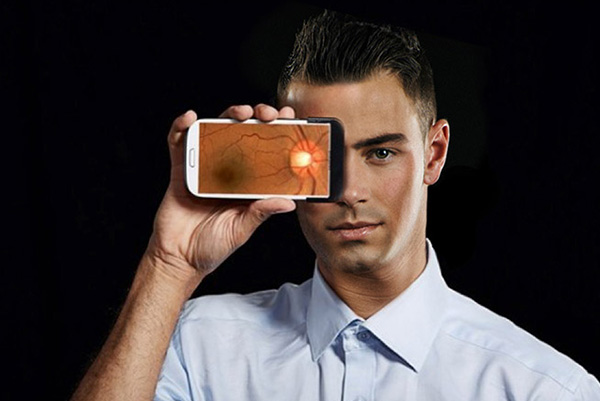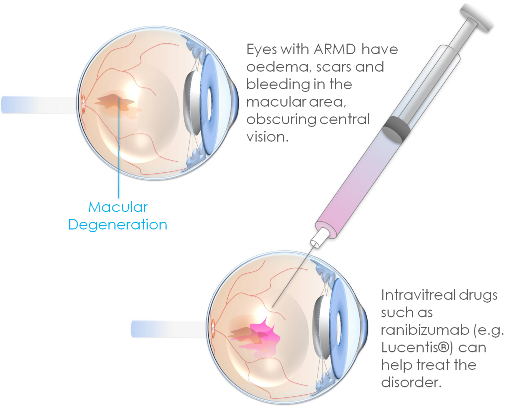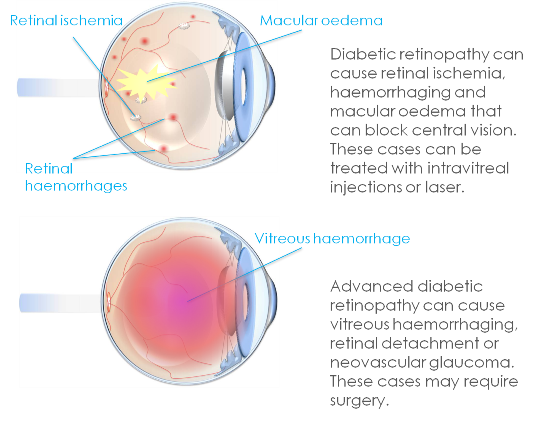

 Multiple available treatments which restore vision and reverse blindness.
Multiple available treatments which restore vision and reverse blindness.
Age-related Macular Degeneration Treatment
The Problem
Age-related Macular Degeneration is a painless condition affecting the eye, which causes a loss of central vision. In other words what you see right in front of you gets more and more blurry, but the edges of your vision look normal. As well as getting blank spots you can also get distortion of the image too.
There are two types of Age-related Macular Degeneration or AMD. ‘Dry’ AMD and ‘Wet’ AMD.
The Age-related Macular Degeneration Treatment
People who develop dry macular degeneration must carefully and constantly monitor their central vision, because many people with Dry AMD go on to develop the Wet form.
There is no specific treatment for Dry AMD although some studies (The Age-Related Eye Disease Study, AREDS) have shown that taking high-doses of certain vitamins and Zinc slowed down vision loss in people with intermediate or advanced AMD.
Another study (‘AREDS II’) is looking at the effects of other vitamins (including Lutein and Zeaxanthin, which are found in the Macula) on people with AMD.
The supplements that are thought to help are:
Vitamin C
Vitamin E
Beta-Carotene
Zinc oxide
Cupric oxide
Certain foods contain higher levels of these compounds, foods such as:
Oranges
Kiwi fruit
Tomatoes
Carrots (Yes, they really are good for your eyes!)
Leafy green vegetables
Mangoes
Peas
Sweetcorn
Supplementing your diet with these foods may help your vision and will certainly give you other general health benefits, but please consult your doctor/eye specialist before taking them.
Until recently there was very little that could be done to help people with wet AMD. None of our treatments were very good and for most people AMD meant bad news.
However, over the last few years there has been a revolution in treating wet AMD as new treatments have become available. The most exciting of these so far are the anti-VEGF drugs Avastin and Eylea.
The most effective treatment is a medicine that is injected into the gel at the back of the eye known as the vitreous. This shrinks the abnormal blood vessels and clears the fluid from the macula. Several injections are often needed to completely treat the condition.
The Results
Restoring vision and reversing blindness.

Diabetes
Diabetes affects up to 3% of the world population. Diabetic Retinopathy refers to the effect of diabetes on the retina (the light sensitive part of the back of the eye). Not everyone with diabetes gets diabetic retinopathy, but it is related to the duration of the diabetes and the metabolic control of the patients. Patients that control their diabetes poorly can develop retinopathy within a few years whilst patients that control their diabetes well may not develop retinopathy at all.
Diabetic retinopathy affects the small arteries and capillaries in the retina, causing haemorrhages within the retina or to the vitreous cavity and growth of abnormal blood vessels within the retina. It presents with blurred or distorted vision due to vitreous abnormalities and macular oedema. If untreated, late stage proliferation diabetic retinopathy can cause retinal detachment, severe glaucoma (neovascular glaucoma) and blindness.
Early diabetic retinopathy is often asymptomatic. The retina should be screened regularly to detect early background diabetic retinopathy that may progress. Symptoms depend on how advanced the disease is but the main one is visual impairment to some degree.
The Treatment
The treatment for diabetic retinopathy depends on what type of diabetes in the eye you have. Sometimes treatment is not needed, and it is enough to sustain good metabolic control and have ophthalmological examinations regularly. If the disease continues to progress despite this, the next step may be laser treatment. Patients with neovascular glaucoma, retinal detachment or haemorrhages inside the eye may require medical treatment and vitreoretinal surgery. The new medical treatments for diabetic retinopathy may involve eye injections of special drugs which arrest the retinopathy and stabilise or improve the vision.
The Results
The result is a stabilised or improved vision.
Product Range
Our product range includes:
Eye injections
Laser treatment
